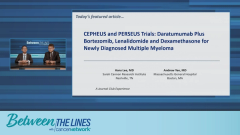
PERSEUS Trial: Design/Baseline Characteristics
Panelists discuss the Perseus study, which compared daratumumab-based quadruplet therapy (Dara-VRD) with VRD alone in patients with newly diagnosed, transplant-eligible multiple myeloma, highlighting its focus on a generally fit population and demonstrating improved progression-free survival and deeper responses with the 4-drug regimen, while noting some limitations in applicability to patients with significant comorbidities.
Episodes in this series

The Perseus study was a landmark trial comparing 2 treatment regimens—Dara-VRD (daratumumab with bortezomib, lenalidomide, and dexamethasone) vs VRD alone—in patients with newly diagnosed, transplant-eligible multiple myeloma. Enrolling patients with a good ECOG performance status (0 to 2), the study design included induction with either regimen, followed by autologous stem cell transplant and additional consolidation cycles. Maintenance therapy consisted of lenalidomide with or without daratumumab, with discontinuation of daratumumab allowed if patients achieved sustained minimal residual disease (MRD) negativity after 2 years. The primary end point was progression-free survival, with secondary end points including overall survival and depth of response, such as MRD negativity.
The study population reflected a younger and generally healthier demographic, with a median age around 60 years and mostly standard-risk cytogenetics. About 75% of patients had standard-risk profiles, while roughly 25% had high-risk genetic features. The majority had an ECOG score of 0, highlighting the trial’s focus on fit patients suitable for transplant. This aligns with typical clinical trial populations, which often exclude patients with more advanced disease or significant comorbidities such as severe kidney impairment that would preclude eligibility.
While clinical trial populations may not perfectly mirror real-world patients, the Perseus study findings are broadly applicable to the general newly diagnosed, transplant-eligible multiple myeloma population. Exceptions might include patients with significant organ dysfunction or those on dialysis, who often face challenges in meeting strict trial criteria. Nonetheless, the robust data from Perseus provide a strong foundation to guide treatment decisions for most transplant-eligible patients, supporting the use of daratumumab-based 4-drug regimens to improve progression-free survival and deepen treatment responses.
Newsletter
Stay up to date on recent advances in the multidisciplinary approach to cancer.





































